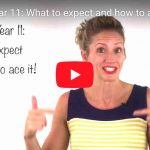Moving up to the next year group can feel like a big deal and can be pretty daunting (whether students choose to show it, or not).
There might be butterflies of excitement (‘Yesssss – Year 9 always sounded so cool’).
Or butterflies of anxiety or worry (in an ‘Eek! Y9! OMG – Things are gonna start getting tough!’ kinda way).
So, here’s what your teen can expect and should be ready to look out for as they embark on Year 9 – so they’re not only feeling cool and calm about what lies ahead, but can also really make the most of the opportunities to show their best work.
Okay, so your teen’s going into Year 9!….
There are gonna be a few things that feel pretty similar to Year 8, but also a couple of significant changes in the tasks they’ll likely be set.
Things that won’t change too much are the level and quantity of the subject content that is being taught. So no need to worry about anything suddenly feeling super-difficult or being out of their depth in terms of knowledge and understanding of a subject if they went okay with it last year.
Of course, they may have one or two new subjects if they have electives starting this year and that’ll be really exciting. This could be the place where there might be a steeper learning curve if it’s a brand new subject, like a new language perhaps. But of course the teachers and the syllabus will take account of that and most other students will be in the same boat, so nothing to worry about. Students just need to be willing and able to ask for help if they need it, for example from teachers, parents or tutors, or know where to find additional help or resources on the internet, for example tutorials on YouTube or subject-specific websites such as ‘Litcharts’ for English literature.
The one thing your teen might notice a change in though is the types of tasks they’re set. Rather than the more standard – e.g. answer these text book Qs for homework – they may be set more extended tasks like research assignments or even, perhaps their first essay.
These will require some independent research as well as the ability to structure a comprehensive but clear response.
At this stage teachers will most likely give them a scaffold or model to help with structure, but just in case they don’t, or you’d still like a bit more help with that then, try using my tip that I blogged about previously – ‘Write the Intro Last’.
I know. It sounds a bit backwards, but everyone who’s used it has told me how well it’s worked so give it a go 🙂
Plus, that independent research I mentioned – well that can massively sap your teen’s time.
So try out these tips too:
3 Google Hacks to help you research and find information that’s actually useful
And
So there you have it.
Not too much change in the demands of the subject content, a bit of excitement for new electives (or perhaps just having been able to drop one that they didn’t enjoy!) and some new expectations in terms of likely more extended tasks, inquiries or investigations. Maybe even the first essay!
So be sure to use those tips I mentioned to help deal with those or just have a browse for other related tips using the categories in my blog at the bottom-right of the page.
Clicking on the ‘Assignments’ tag in the column of tags to the right of this post will be a good place to start 🙂
I really hope that helps with any pre-Term 1 nerves or anxieties, as well as giving you some go-to tips and strategies.
Leave me a comment or drop me an email and let me know… What’s the thing your teen’s most concerned about for the next school year, or the thing they’re most looking forward to?
And look out for my Term 1 parent information event coming up very soon.
(Totally free and with a new twist for 2019! Woop woop!).
Here’s to a SUPER- happy and successful year ahead and until next week, let’s make this a fantastic week!
Katie 🙂


